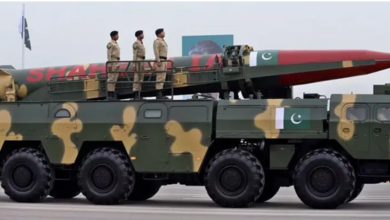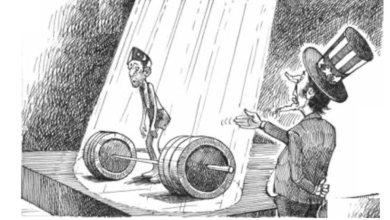On August 14, 1947, when Pakistan emerged on the world map as the state with the largest Muslim population, the Father of the Nation, Quaid-e-Azam Muhammad Ali Jinnah, did not refuse Lord Mountbatten the position of the first Governor-General because he himself desired it. Rather, he did so to make it clear to his own people and the world at large that British rule had ended, and the era of democracy had begun. The country’s decisions would henceforth be made within its own borders. This was a symbol of political freedom.
A year later, when the issue arose of whether Pakistan’s assets should remain deposited with the Reserve Bank of India or if the country should have its own bank, Quaid-e-Azam decided that an independent Pakistan should have its own independent bank. Thus, he declared economic independence by announcing the establishment of the State Bank of Pakistan. During the inauguration of Pakistan’s first State Bank, housed in a historic building in Karachi’s Bolton Market, he stated that he did not want an economic system where the rich become richer, and the poor become poorer. He condemned the interest-based system as exploitative and urged economists and religious scholars to research and contemplate the establishment of banking based on Islamic principles. Similarly, he emphasized the need to eliminate exploitation and establish a welfare state in the port city of Chittagong, then part of East Pakistan.
Quaid-e-Azam laid down guiding principles for Pakistan’s foreign policy, stating that Pakistan desires friendly relations with every nation on an equal footing but will continue to support oppressed peoples. This was not merely a political statement, as power-hungry leaders often make to please their foreign masters after coming into power. Quaid-e-Azam openly supported the independence struggles of the people of Palestine, South Africa, and Indonesia, and took concrete steps towards the elimination of racial discrimination and colonialism. If it is said that he only supported the freedom of Muslim countries, then why did he support the predominantly non-Muslim population of South Africa?
In the tribal areas of Pakistan, Quaid-e-Azam withdrew the troops that had been stationed there since the British era, declaring that now our tribal brothers would protect our northwestern borders. However, little did he know that sixty years later, a self-proclaimed guardian of Pakistan, acting on the orders of a pharaoh seated in the White House, would redeploy the military to those abandoned outposts, now in ruins, just as the British colonial masters had tightened their grip on the freedom-loving tribes of the subcontinent. In those days, political agents would bribe select tribal leaders to buy their loyalties. During the reign of this dictator, this business reached its peak as he allowed the CIA to establish bases in the tribal areas in exchange for a few dollars, thus betraying the Quaid, the nation, and the state.
But this unfortunate trend had begun even before the arrival of this dictator when the American secret police, the FBI, was allowed to establish offices on Pakistani soil. Is it not ironic that the founder of Pakistan, Quaid-e-Azam, was not willing to accept a British Governor-General and was systematically dismantling the remnants of colonialism, while nearly half a century after his death, the rulers of Pakistan were hosting foreign agents and spies on their soil? The situation has now reached such a point that puppet rulers have become so fearful of their own people, especially the proud tribesmen, that they have chosen to enslave themselves to foreign forces, Zionists, and Crusaders in order to safeguard their illegitimate rule. Can anyone imagine a government feeling so threatened by its own people, its religion, its beliefs, and its ideology that it has to import foreign agents and non-Islamic ideologies to protect itself? When a Blackwater mercenary brazenly shoots a Pakistani in broad daylight on a famous street in Lahore, and the heads of state institutions, including President Asif Zardari, arrange for his safe passage back to the United States by paying blood money from the national treasury, and that same Raymond Davis, in his self-authored book, blackens the faces of those Pakistani officials who facilitated his release, how can one imagine such a betrayal?
Some people reference Quaid-e-Azam’s August 11 speech in such a way as to suggest that it was the only speech he ever made, as if all his other speeches were rendered null and void. They conveniently ignore the numerous statements in which he clearly and repeatedly articulated that Pakistan would be an Islamic welfare state. He also made it clear to the nation that Islam does not endorse any class system like Papacy or Brahmanism that would grant any group a hereditary right to state control. Those who claim that Quaid-e-Azam wanted a secular state must answer why he demanded Pakistan in the first place. Was it merely to create two secular states in the subcontinent—Pakistan and India? If Pakistan was created as a result of the right to self-determination, what distinguishes it from India if not the element of Islam that separates the two?
Who can deny the historical fact that the Muslims of the minority provinces of the Indian subcontinent supported the demand for Pakistan out of a spirit of unity? Therefore, to say that the public support for the demand for Pakistan was driven by economic motives is completely incorrect. What economic benefits could the Muslims of the minority provinces have expected from the creation of Pakistan? They were left at the mercy of the Hindu majority. However, I cannot speak for the intentions of those landlords and capitalists who, overnight, left the Unionist Party and joined the ruling Muslim League to secure their privileges. Nor will I comment on those opportunists who migrated from India to Pakistan driven by greed for property, wealth, and power.
In fact, it is also true that many leaders of a particular ethnic party in Pakistan remained in India at the time of partition. Despite their small numbers, they have donned the cloak of ‘migrants’ (Muhajirs) to gain sympathy and pursue their political agenda here, even though they initially stayed in India to assess the economic and political situation in Pakistan. They sold their businesses and other properties at good prices and then came to Pakistan, where they profited handsomely while labelling themselves as migrants. Through the bureaucracy, they established themselves as rulers in Pakistan’s civil service and other key institutions, much like the British colonialists, and today, they shamelessly loot the country and boast about the sacrifices their forefathers made for Pakistan. Yet, the majority of sincere migrants deeply resent them.
The motivations of these classes were undoubtedly economic, but millions of people living in Pakistan played their part in the struggle for Pakistan, driven by Islamic zeal. Many were martyred, many lost their honour, but their resolve never wavered. Over a hundred thousand Muslim girls were abducted by Hindus and Sikhs, and even today, they must be raising their eyes to the sky, praying for the safety of Pakistan. If this was not the spirit of faith, then what was it? Behind it was the legacy of Karbala, and its oxygen was the ideology of the Khilafat Movement.
Did the Muslim masses make such immense sacrifices for a homeland only to see it fall under American dominance, where a lowly American official would dictate who should be the Prime Minister, the Interior Minister, the National Security Advisor, or the Chief Justice of the country? Did Quaid-e-Azam Muhammad Ali Jinnah withdraw Pakistan’s assets from the Reserve Bank of India and place them in the State Bank of Pakistan so that a “country manager” from Citibank could be imported and made Prime Minister, selling off Pakistan’s national assets for a pittance and disappearing into the night with his commission? This wasn’t where it ended—later, an active IMF representative was made the Governor of the State Bank, handing over the country’s entire financial security to them.
Did Quaid-e-Azam support a plebiscite in Kashmir so that some opportunist could later declare that all the UN Security Council resolutions regarding the plebiscite were no longer necessary? As I mentioned at the outset, Quaid-e-Azam withdrew troops from tribal areas, but the commando Musharraf not only reinstated military operations, he also pulled 110,000 troops from the Pakistan-India border and deployed them on the Afghan border, again at the behest of the Pharaoh in the White House—not to protect Pakistan from external aggression, but to impose an American puppet government on the Afghan people so that the US occupation of Afghanistan could continue. At that time, people like us screamed and shouted that if India, which was repeatedly violating the ceasefire along the Line of Control, attacked Pakistan, what would happen? If our defensive line spread as far as the Durand Line, who would defend the eastern front? America? When Napoleon, Hitler, and Brezhnev could not fight on two fronts, how would Pakistan’s generals defend both the Afghan and Indian borders? But in response, the Pakistani media was ordered to silence us completely, and all my writings were banned. However, Allah is merciful, and the coward who imposed that ban fled the country, with only his body returning.
It is said that a secret agreement was hinted at with India on all disputed issues based on assurances from the United States, which is why the government withdrew 110,000 troops from the Pakistan-India border and deployed them on the Afghan border. Just six years after the death of Quaid-e-Azam, the bureaucracy gave the US military bases on our soil, from which reconnaissance flights against the Soviet Union were conducted, leading Russia to view Pakistan as an enemy and to veto the plebiscite resolution on Kashmir in the UN Security Council, rendering it void. Similarly, the resolution calling for the withdrawal of troops from East Pakistan was annulled, providing India with the opportunity to fully occupy East Pakistan. But the most painful part is that, as recorded in the dark pages of our history, Kashmir was served to Modi on a platter under orders from the Pharaoh in the White House. I have documented this agonising story many times in my columns.
It cannot be denied that the Muslims of the minority provinces in British India supported the demand for Pakistan out of a spirit of unity. Therefore, it is entirely incorrect to say that the public support for the demand for Pakistan was driven by economic motives. What economic benefits could the Muslims of the minority provinces have expected from the creation of Pakistan? They were, in fact, left as hostages to the Hindu majority. I cannot speak to the intentions of those landlords and capitalists who, overnight, abandoned the Unionist Party to join the ruling Muslim League to preserve their privileges. Nor will I discuss those self-serving individuals who migrated from India to Pakistan in pursuit of property, wealth, and status.
In reality, many leaders of a certain ethnic party in Pakistan today stayed in India at the time of Pakistan’s creation. Despite being a small minority, they have adopted the label of “migrants” to gain sympathy and pursue their political agenda. Instead of immediately coming to Pakistan, they waited to see what direction the economic and political conditions in Pakistan would take. After selling their businesses and other assets in India for a good price, they moved to Pakistan under the guise of being migrants, amassing wealth in the process. Through the bureaucracy, they became rulers, much like the British, and today, in addition to looting the country openly, they shamelessly claim their ancestors’ sacrifices for Pakistan. However, the majority of sincere migrants are deeply discontented with them.
These mentioned classes indeed had economic motivations, but the millions of people already living in Pakistan played their role in the struggle for Pakistan, driven by Islamic fervour. Many sacrificed their lives, countless honours were lost, but their resolve never wavered. Over a hundred thousand Muslim girls were abducted by Hindus and Sikhs, and even today, undoubtedly, they look up to the sky, praying for the safety of Pakistan. If this was not an act of faith, then what was it? It was backed by the legacy of Karbala, and its oxygen was the ideology of the Khilafat Movement.
Did the Muslim masses make so many sacrifices for a homeland so that it would come under American control? Did they endure this so that a minor American official could dictate who should be the Prime Minister, who should be the Interior Minister, who should be the National Security Advisor, who should be appointed as the ambassador, and who should lead the judiciary? Did Quaid-e-Azam Muhammad Ali Jinnah withdraw Pakistan’s assets from the Reserve Bank of India and place them in the State Bank of Pakistan so that a country manager from Citibank could be imported and made the Prime Minister, only to sell off national assets at rock-bottom prices and disappear into the night with his commission? The audacity did not stop there, for the IMF’s serving representative was later appointed as the Governor of the State Bank, giving them complete control over the financial security of the country.
Did Quaid-e-Azam support the plebiscite in Kashmir so that some opportunist could come along and declare that all UN Security Council resolutions on the matter were now irrelevant? As I mentioned earlier, Quaid-e-Azam withdrew the army from tribal areas, but General Musharraf not only launched military operations there but also redeployed 110,000 troops from the Indo-Pak border to the tribal areas and the Afghan border on the orders of the Pharaoh in the White House! Not to defend Pakistan from external aggression, but to impose a puppet government in Afghanistan on its people so that America’s occupation could be maintained. At the time, voices like mine cried out that if India, which repeatedly violated the ceasefire line, were to attack Pakistan, what would happen? If our defence line extended to the Durand Line, who would fight on the eastern front? America? If Napoleon, Hitler, and Brezhnev couldn’t fight on two fronts, could Pakistan’s generals defend both the Afghan and Indian borders? In response, the Pakistani media was ordered to silence all my writings, but Allah is indeed Merciful, for the coward who imposed this ban fled the country, and only his body could return. (So, take warning, O people of vision) فَاعْتَبِرُوا يَاأُولِي الْأَبْصَارِ.
It is said that based on assurances from the United States, a secret compromise was indicated on all disputed issues with India, after which the government withdrew 110,000 troops from the Indo-Pak border and stationed them on the Afghan border. Just six years after Quaid-e-Azam’s death, the bureaucracy gave military bases to the United States, from where reconnaissance flights were conducted against the Soviet Union, leading Russia to consider Pakistan its enemy. In retaliation, Russia vetoed the resolution on the Kashmir plebiscite, rendering it void. Similarly, the resolution to withdraw troops from East Pakistan was annulled, giving India a full opportunity to invade East Pakistan. But what is most shocking is how, on the orders of the White House Pharaoh, Kashmir was handed over to Modi on a platter. I have chronicled this painful story many times in my columns.
Now, the need of the hour is for us to play our part in freeing our country from the clutches of imperial forces, fulfilling the promise we made to our Lord: “O Lord! Grant us a land where we can live according to the Quran and Sunnah.” Our Merciful and Gracious Lord granted us this miraculous state on the most blessed night of Ramadan, “Laylat ul-Qadr.” Without a single bullet being fired, our Quaid handed us the realization of Allama Iqbal’s dream through the tireless efforts of all his loyal companions. But the question is, have we truly fulfilled the covenant we made with our Lord? The answer, unfortunately, is no. Let us first, with utmost remorse, prostrate ourselves before our Lord in collective repentance, seeking the grace to renew our covenant and embark on the path for which this state was created. We must pledge today to dedicate all our energies sincerely to the implementation of the Quran and Sunnah in our country and to ensure that all the covenant-breakers are brought to their ultimate fate along with their foreign masters, Insha’Allah. May Allah be our protector and helper. Ameen.






